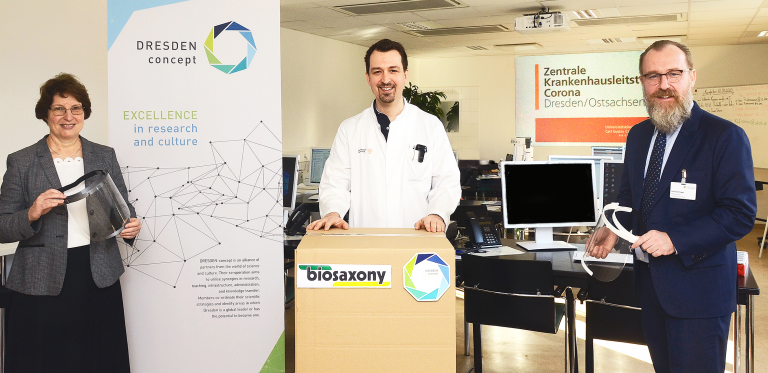DRESDEN-concept delivers 3D-printed protective visors to clinics in Dresden
02.04.2020
 U.Lippke, UKD
U.Lippke, UKD
Numerous DRESDEN-concept (DDc) partners produce face shields for medical staff in cooperation with the trade association for biotechnology and medical technology biosaxony using 3D printing. Today, many of these protective visors were delivered to the municipal clinics in Dresden by the Carl Gustav Carus University Hospital. The university hospital is responsible for the distribution to Dresden and the surrounding area.
Last week, DRESDEN-concept suggested the possibility of using 3D printed products to help out in the event of any supply shortages. Numerous research institutions and company representatives from Saxony contacted us. Nearly 50 3D printers from research institutions from Dresden and Leipzig have now been made available. Businesses from all over Saxony are also intensively involved in this project. Examples include Sander Kunststofftechnik from Dresden, which produces mask holders free of charge using 3D printing, and Spezi Pack Karl Spethmann GmbH from Klingenberg, which also provides the visors free of charge.
“We are overwhelmed by the great commitment of the DRESDEN-concept partners and of the companies in Saxony. Members of staff on all levels, from PhD students to professors and company directors, are working round the clock to counterbalance the shortages of protective visors using printed models. The DDc partners and the businesses provide unbureaucratic support with resources, materials and equipment”, says professor Brigitte Voit, board member of DRESDEN-concept and Scientific Director of the Leibniz Institute of Polymer Research Dresden.
Based on open source documents for the production of protective visors, researchers of the University Hospital Dresden, the Leibniz Institute of Polymer Research Dresden, the Helmholtz Centre Dresden-Rossendorf, the Fraunhofer Institute for Material and Beam Technology (IWS) alongside staff of the hospitals in Dresden developed masks that are comfortable and fit well, even if they are worn for a prolonged period of time. The 3D print data can be accessed by anyone free of charge via the websites of biosaxony and DRESDEN-concept.
“We are pleased to be able to counterbalance material shortages and supply bottlenecks in Eastern Saxony with this highly professional range of 3D printed products,” says PD (Privatdozent) Dr Christian Kleber, Head of the Central Hospital Control Centre of Dresden-East Saxony. “We will now distribute these protective visors to all hospitals within the region, depending on their demand.”
The components produced by 3D printing can be delivered to four collection points in Dresden, where they are regularly collected by the TU Dresden transport service and brought to the control centre at the University Hospital. A similar system is being prepared by biosaxony for the Leipzig area. PhD students and staff of the University Hospital, TU Dresden and biosaxony subsequently carry out quality checks, disinfect the masks and prepare them for distribution.
If the project partners have dispensable reserves of laser-cut transparent film (e.g. PETG, film thickness 0.5 mm – 0.75 mm), they are kindly requested to inform the following contact persons:
Contact person for research institutions:
Lena Herlitzius, DRESDEN-concept Advisor TU Dresden: lena.herlitzius@tu-dresden.de, Tel.: +49 351 46340427
Contact person for businesses:
André Hofmann, CEO biosaxony: hofmann@biosaxony.com, Tel.: +49 351 796 5501
Further links:
biosaxony: https://www.biosaxony.com/projekte/3d-druck-initiative
DRESDEN-concept: https://dresden-concept.de/de/services/coronavirus.html
DRESDEN-concept is an alliance of 32 partners from science and culture. The cooperation in DRESDEN-concept facilitates the development and use of synergies for its partners in the fields of research, education, infrastructure, administration and transfer. For this purpose, they coordinate their scientific strategy and identify the areas in which Dresden is an international leader. The partners work together to attract world leading scientists to Dresden and maintain them at the science hub. DRESDEN is an acronym and stands for Dresden Research and Education Synergies for the Development of Excellence and Novelty.
Biosaxony is the association for biotechnology and medical technology in Saxony. Its members include businesses, research institutions, as well as stakeholders and suppliers of the industry. Its tasks include initiating projects between industry and science, providing services and expertise, and presenting regional knowledge in order to support the valuable development of these cross-sectional technologies, thereby strengthening Saxony as an economic region.
Contact person for media enquiries:
Romy Conrad
Coordinator of the Head Office of
DRESDEN-concept e.V.
Phone.: +49 351 463 43178
E-Mail: geschaeftsstelle(at)dresden-concept.de
© R. Jungnickel